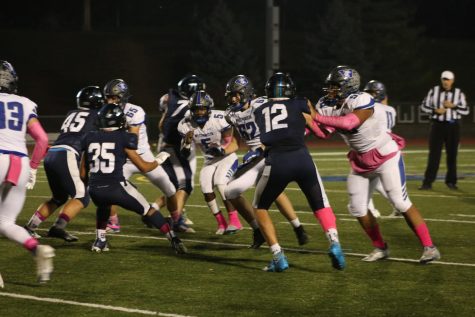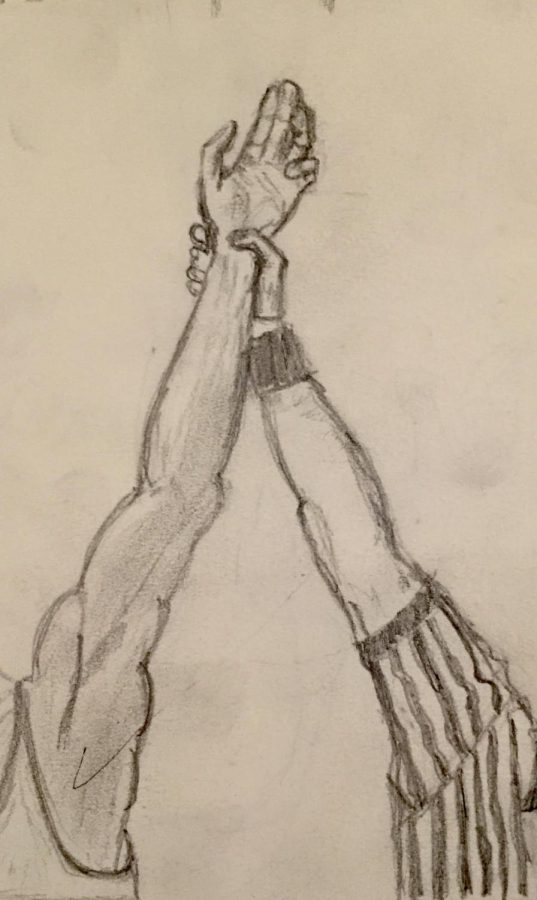When the Collision Counts
Concerned parents are working towards the downfall of contact sports.
Contact sports develop mental toughness in athletes just as much as physical strength.
The times, they are a changin’. Even in my own lifetime, people’s view on contact sports has changed. In some areas, parents are not letting their kids play contact sports, and schools are moving toward safer options for younger kids.
Westminster’s seventh grade football team is no longer a contact team. They play modified flag football then move onto normal tackle football in their next year as eighth graders.
Before I go any further, let me explain my terminology. People define contact sports differently. When I say contact sports, I’m talking about the sports where a fundamental part of the game is collision with the opponents like football, hockey, wrestling, and rugby.
Sports teach discipline, toughness, humility, and perseverance. People need these types of characteristics to make it in this world. It’s hard for anyone to learn and obtain these qualities in general, but it’s especially hard for people who have never played a sport. Non-contact sports teach these qualities, but I would argue that it is not to the same extent that contact sports do.
While we might be saving some kids from concussions and worse injuries, we are changing and taking away opportunities that form kids into productive citizens. Injuries happen in contact sports and rather frequently. I would have loved to have never gotten the injuries I have had through sports, but that’s life.
Fighting the mental and physical battles of a sports related injury is not something that anyone wants to go through. Going through situations like these prepare you for the difficult times in life that are bound to happen. Suffering is a part of life, and protecting our youth too much only makes it harder for them in the future.
Playing a contact sport forces kids into mental challenges that you just can’t replicate with non-contact sports. I believe that contact sports shape your character more, partly because of the risks you’re taking.
Personally, I play contact sports, but I’ve also played baseball since I was little. Baseball has taught me some of the same qualities that I learned in football and wrestling. So, why is playing contact sports worth the risks?
Football instilled in me a different type of toughness than baseball did, and wrestling taught me a different type of toughness that football did. All sports produce mental challenges. Physical toughness is something that some will never obtain and some don’t even need. However, mental toughness is not the same. Mental toughness is something every individual needs no matter what they do in life. In my experiences, the physical struggles in contact sports are what created the greatest mental struggles.

I am biased to the sport of wrestling, but Dan Gable puts it like this, “Once you’ve wrestled, everything else in life is easy.” Essentially, Gable argues, everything you have to go through in the sport of wrestling prepares you for the real world. Once you have been through the mental challenges on the wrestling mat, you are better equipped for the mental challenges that arise from your occupation, relationships, and more.
Wrestling puts you in situations that you will never be in any other high school sport. It’s you versus the other guy. There’s nobody to blame and nobody to lean on. Everything is on you, and you have to deal with that, along with the physical stress that it takes to control another athlete. The combination of physical and mental strength that a contact sport demands puts pressure on the athlete that strengthens their character like no other activity.
In Teddy Roosevelt’s “The Man in the Arena” speech, he emphasises this concept: “The credit belongs to the man who is actually in the arena, whose face is marred by dust and sweat and blood; who strives valiantly; who errs, who comes short again and again.”
Roosevelt’s speech is special because it is about the connection between life and sports. The “doer” in life is like the man in the arena, and sports are essentially a stripped down version of life. Life is going to have you down by a takedown with thirty seconds left, in the penalty box, third and goal, and so on.
Contact sports are important to our society and the growth of our youth. We can already see the effects of kids not playing contact sports; they are growing into adults that aren’t as tough, aren’t as disciplined, and aren’t as prepared for life’s challenges as the kids that played a contact sport.




